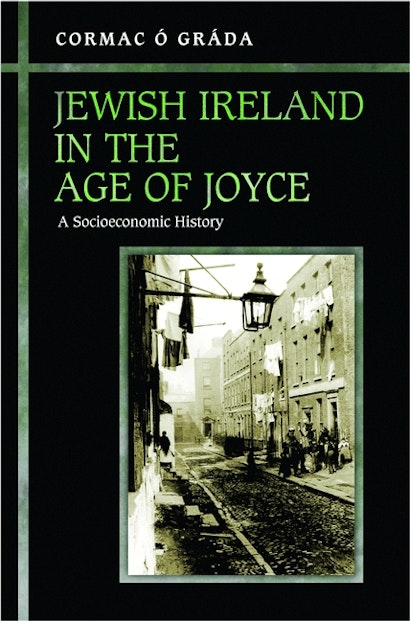James Joyce’s Leopold Bloom—the atheistic Everyman of Ulysses, son of a Hungarian Jewish father and an Irish Protestant mother—may have turned the world’s literary eyes on Dublin, but those who look to him for history should think again. He could hardly have been a product of the city’s bona fide Jewish community, where intermarriage with outsiders was rare and piety was pronounced. In Jewish Ireland in the Age of Joyce, a leading economic historian tells the real story of how Jewish Ireland—and Dublin’s Little Jerusalem in particular—made ends meet from the 1870s, when the first Lithuanian Jewish immigrants landed in Dublin, to the late 1940s, just before the community began its dramatic decline.
In 1866—the year Bloom was born—Dublin’s Jewish population hardly existed, and on the eve of World War I it numbered barely three thousand. But this small group of people quickly found an economic niche in an era of depression, and developed a surprisingly vibrant web of institutions.
In a richly detailed, elegantly written blend of historical, economic, and demographic analysis, Cormac Ó Gráda examines the challenges this community faced. He asks how its patterns of child rearing, schooling, and cultural and religious behavior influenced its marital, fertility, and infant-mortality rates. He argues that the community’s small size shaped its occupational profile and influenced its acculturation; it also compromised its viability in the long run.
Jewish Ireland in the Age of Joyce presents a fascinating portrait of a group of people in an unlikely location who, though small in number, comprised Ireland’s most resilient immigrant community until the Celtic Tiger’s immigration surge of the 1990s.
Awards and Recognition
- Co-Winner of the 2006 James S. Donnelly, Sr. Prize, American Conference for Irish Studies
Cormac Ó Gráda is Professor of Economics at University College Dublin. His seven previous books include Black '47 and Beyond (Princeton), which won the 2000 James J. Donnelly, Sr., Prize for Best Book on Irish History or Social Studies and was one of Choice's Outstanding Academic Books of 1999.
"While much has been written about the Jewishness of James Joyce's Leopold Bloom . . . few know anything about the remarkable community in Ireland that inspired Joyce to create him . . . This work is extremely detailed, describing the Jewish communities down to the streets they lived on and what they ate. . . . Gráda's Jewish Ireland in the Age of Joyce is a scholarly comprehensive tome full of hard facts and anecdotal tidbits on this little-known chapter in the story of the Ashkenazic Diaspora that will appeal to history buffs and literary fanatics alike."—Caraid O'Brien, Forward
"This remarkable book traces the social, economic and demographic history of the Irish Jewish community between, roughly, 1870 and 1976. . . . The book traces the educational and economic rise of the community. . . . A wonderful feature of this book is its superb library of quotations, which appear in twos and threes at the head of each chapter and throughout the text. These extracts from the literature and sayings of the Irish Jews would make a short book in themselves."—Adrian Hardiman, Irish Times
"This is a scholarly work, but the non-academic reader should not be put off by the scholarship. In-between the tables and graphs, there is a wonderfully curious, endlessly entertaining, and deeply humane book. Joyce would have loved it."—Brian Lynch, Irish Independent
"Ó Gráda provides a definitive socio-economic study . . . covering everything from the occupational profile and literacy levels of this community to the density of Jewish settlement in particular Dublin neighborhoods. But he has also produced a moving tribute to (what he terms) this 'small Irish tributary' of the mass Jewish exodus from Eastern Europe, which . . . overcame most of the challenges and limited opportunities it faced in establishing a new life in Ireland."—Rory Miller, Journal of Jewish Studies
"For both Joyce scholars and historians of immigrant groups in Britain, this study is a fascinating piece of research that, much to its credit, relates a host of interview testimony to fill out the flavor and nuance of the Irish-Jewish community during what would prove to be its heyday."—Neil R. Davison, The Historian
"Written with quiet assurance and understated authority, Cormac Ó Gráda's richly detailed look at a small group of people tells us something very important about the economic history of Ireland and about the gaps in that society that Jews could fill. It also shows how Jews in general made ends meet in the merciless economics of Diaspora. But, most importantly, this book tells us how even a small ethnic community can embody a powerful economic principle; how culture, religion, tradition, and investment in different kinds of human capital play roles in the formation and operation of economic institutions."—Joel Mokyr, Northwestern University, author of Gifts of Athena
"Cormac Ó Gráda has written a fascinating economic and demographic history of Irish Jewry in the late nineteenth and early twentieth centuries. He tracks the emergence and subsequent shrinkage of this Ashkenazic Jewish community. This is an outstanding addition to the growing literature on the history of very small Diaspora communities. The writing style will attract both scholars and history buffs of Ireland and of Diaspora Jewry."—Barry R. Chiswick, University of Illinois at Chicago, author of The Economics of Immigration
"Jewish Ireland in the Age of Joyce compels a reconsideration of innumerable assumptions about Joyce's picture of Dublin, and this landmark work should spark off a fundamental debate about the relationship between imaginative literature and history. Sure to be pored over by specialists in a wide range of fields, this is one of the most exciting examples of scholarly enquiry I have read in many years."—J. J. Lee, New York University and University College, Cork, author of Ireland, 1912–1985: Politics and Society


